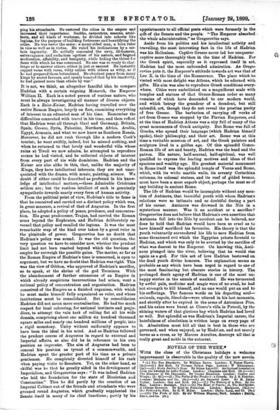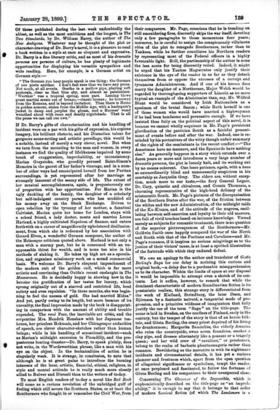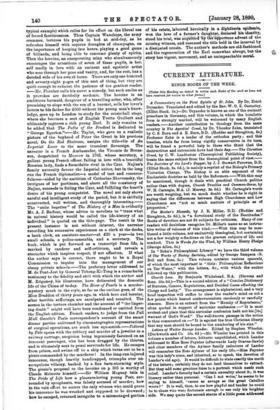NOVELS OF THE WEEK.*
Wum the close of the Christmas holidays a welcome improvement is observable in the quality of the new novels.
• (1.) The Two Standards. By William Barry. London: T. Fisher 17nyrin. i63.1—(2.) Red Rock. By Thomas Nelson Page. London : W Heinemann. its.]-04 Gusts Berlinv's Saga. By Selma Lagerrot. Authorised translation from the uwedish by Lithe Tudeer. London: Chapman and Hall. [88.]—(4.) The Glamour of the impossOle. By Cosmo Hamilton. London: Chatto and
Windu,. 6d.1—(3.> The Paths of the Prude..t : a Comedy. By J. B. Fletcher. London: Methuen and Co. 16,3.1-16.) An Intverial Lover. Br M. Imlay Taylor. London: Gay and Bird, [6s.)--(7.) The History of a Han. By the Mau. London : Burieigh. [6e.]—(d.) The River of Pearls; or, The Zed Spider. A Chinese Romance. By RenO de Pont-Jest. London: liacqueen. [60J--; (9.) Fettered be Fate. By G. W. Miller. London : Digby. Lang, and Co [0.1. —(10.) Tito Pride of Life. By Sir William Magnay. Bart. 10‘49111 .. EL6r, and Co. [6a.1
Of those published daring the last week undoubtedly the
ablest, as well as the most ambitious and the longest, is The Two Standards, by Dr. William Barry, the author of The New Antigone. Whatever may be thought of the plot or
character-drawing of Dr. Barry's novel, it is a pleasure to read
111 a book written in a style at once so eloquent and expressive.
Dr. Barry is a fine literary critic, and as most of his dramatis person are persons of culture, he has plenty of legitimate opportunities for displaying his versatile sympathies and wide reading. Here, for example, is a German artist on German style:—
" The German you hear people speak is one thing; the German of our poets another. I don't feel sure that we have any prose. Not much, at all events. Goethe is a mellow pipe, playing soft pastorals, clear as that blue sky, and almost as passionless.
• Werther ' was a tropical spring, soon past. Lessing blows great martial music out of bronze,—classic bronze; he borrowed from the Romans, and is beyond imitation. Then there is Heine in golden armour, stolen from the Middle Age, with a harlequin's jacket to damp and perplex the gleam, and a Hermes' wand wreathed about with roses and deadly nightshade. That is all the prose we can call our own."
If Dr. Barry's gifts of characterisation and his handling of incident were on a par with his gifts of expression, his copious imagery, hie brilliant rhetoric, and his Disraelian talent for gorgeous scene-setting and artistic persiflage, this would be a notable, instead of merely a very clever, novel. But when we turn from the mounting to the men and women, in every instance we find the quality of lifelikeness impaired by some touch of exaggeration, improbability, or inconsistency.
Marian Greystoke, who greedily perused Saint-Simon's Memoirs in the garret of her father's vicarage, and in a num- ber of other ways had emancipated herself from her Puritan surroundings, is yet represented after her marriage as strangely innocent of the seamy aide of life. The extent of her musical accomplishments, again, is preposterously out of proportion with her opportunities. For Marian is the ugly duckling of the family, the daughter of a scholarly but self-indulgent country parson who has muddled all his money away on the Stock Exchange. Driven to open rebellion by the tyranny of her mother, a fanatical Calvinist, Marian quits her home for London, stays with a school friend, a lady doctor, meets and marries Lucas Harland, a highly cultivated Napoleon of finance, and enters forthwith on a career of magnificently upholstered disillusion- ment, from which she is redeemed by her association with Gerard Elven, a wonderful German composer, the author of the Heinescpae criticism quoted above. Harland is not only a man with a stormy past, but he is consumed with an un- appeasable thirst for wealth, and is none too nice in his methods of slaking it. He takes up high art as a specula- tion, and organises missionary work on a sound commercial basis. We welcome Dr. Barry's eloquent impeachment of
the modern cult of the golden calf, which is far more artistic and convincing than °aide's recent onslaught in The
Massarenes. He is decidedly happy in showing how in the heroine the gratification of her tastes for luxury, which sprang originally out of a starved and restricted life, bred satiety and even repulsion. "In three mouths, she was begin- ning to feel the nausea of gold. She had married Midas."
And yet, partly owing to its length, but more because of its unreality, the final impression made by the book is disappoint- ing in comparison with the amount of ability and trouble expended. The roue Peer, the inevitable art critic, and the serpentine Mrs. Hendrik Henshaw with her Japanese tea- house, her priceless Hokusais, and her Chicagesque audacities of speech, are clever character-sketches rather than human beings; while in his handling of sensational incident—such as Marian's midnight excursion to Piccadilly, and the pre- posterous boating disaster—Dr. Barry, to speak plainly, does not write, in the Wordsworthian phrase, like a man with his eye on the object. In the technicalities of action he is singularly weak. It is strange, in conclusion, to note that although he is at great pains to introduce the burning interests of the hour, artistic, financial, ethical, religions, in style and mental attitude he is really much more closely allied to Bulwer and Disraeli than to the writers of to-day.
To most English readers of to-day a novel like Red Rock will come as a curious revelation of the unbridged gulf of feeling which still severs the Southern States, or at least the Southerners who fought in or remember the Civil War, from
their conquerors. Mr. Page, conscious that he is treading on still smouldering fires, discreetly skips the war itself, devoting only a few paragraphs to those momentous four years; moreover, he is careful to assign the conspicuously villainous roles of the plot to renegade Southerners, rather than to Yankees, while he further conciliates his Northern readers by representing most of the Federal officers in a highly favourable light. Still, the partisanship of the author is none the less acute for being discreetly veiled. Indeed, it might be urged that his Yankee Magistrates only justify their existence in the eye of the reader in so far as they detach themselves from or oppose the excesses of a corrupt and tyrannous Administration. And if one of his heroes does marry the daughter of a Northerner, Major Welch would be regarded by thoroughgoing supporters of Lincoln as no more typical an example of the Abolitionist than, say, Mr. Wilfrid Blunt would be considered by Irish Nationalists as a specimen of the brutal Saxon ; while Ruth herself is one of those women who would have married a highwayman if he had been handsome and persuasive enough. If we have insisted thus fully on the political aspect of this novel, it is because we cannot wholly acquiesce in Mr. Page's persistent glorification of the patrician South as a faithful present- ment of events before and after the war. Indeed, one is re- minded by his portraiture of the witty though unfair summary of the rights of the combatants in the recent conflict :—" The Americans have no manners, and the Spaniards have nothing else." As generally happens in a story which extends over a dozen years or more and introduces a very large number of dramatis persona., the plot is loosely knit, and its working out by no means coherent. One loses patience, again, with a hero so extraordinarily blind and unnecessarily suspicious in his courtship as Jacquelin Gray. The eldera are, without excep- tion, much more to our taste,—the fiery General Legaie, Dr. Cary, quixotic and chivalrous, and Cousin Thomasia, charming representative of the high-bred delicacy of the aristocratic South. Mr. Page's pictures of the disorganisation of the Southern States after the war, of the friction between the whites and the new Administration, of the midnight raids of the Ku-Kluxes, and of the attitude of the negroes, oscil- lating between self-assertion and loyalty to their old masters, are full of vivid touches based on intimate knowledge. Viewed merely as subjects for romantic treatment, there is no question of the superior picturesqueness of the Southerners—Mr. Goldwin Smith once happily compared the war of the North and South with that of the Puritans and Cavaliers—and Mr. Page's romance, if it inspires no serious misgivings as to the justice of their victors' cause, is at least a spirited illustration of the fortitude with which they endured defeat.
We owe an apology to the author and translator of G6sta Berlin g's Saga for our delay in noticing this curious and original book,—a delay due to a pardonable misapprehension as to its character. Within the limits of space at our disposal it would be impossible to attempt even a sketch of its con- tents. Let it suffice, however, to remark that while the dominant characteristic of modern Scandinavian fiction is its pessimistic realism, this strange story is differentiated from the work of Kielland, Strindberg, the later Ibsen, and Bjornson by a fantastic naiveté, a tangential mode of pro- gression, and a primitive wildness of imagination that fully justify the use of the term " Saga " on the title-page. The scene is laid in Sweden, on the confines of Finland, early in the century, but the temper of the story is that of an heroic folk. tale, and Giista Belling, the crazy priest deprived of his living for drunkenness ; Margarita Satezelins, the elderly Amazou who rules the countryside, owns seven foundries, smokes a clay pipe, and dresses alternately like a peasant or a tragedy queen; and her wild crew of "cavaliers," or pensioners, belong to the realm of barbaric phantasmagoria rather than romance. Bewildering as the narrative is with its nightmare incidents and circumstantial details, it has yet a curious glamour and freshness which, apart from the open question of allegorical significance or symbolism, tempt the reader. at once perplexed and fascinated, to follow the fortunes of GOsta Berling and his companions to their unexpected close.
Concerning The Glamour of the Impossible, which is euphemistically described on the title-page as "an improb- ability," it is enough to say that it belongs to that order of modern farcical fiction (of which The Londoners is a
typical example) which relies for its effect on the liberal use of forced facetiousness. Thus Captain Wanohope, the army crammer, lectures his pupils in bed at mid-day, as he refreshes himself with copious draughts of champagne, on the importance of keeping late hours, playing a good game of billiards, and being able to consume plenty of spirits. Then the heroine, an exasperating minx who simultaneously encourages the attentions of seven of these pupils, is her. self madly in love with an eminent and egotistic artist who sees through her pose and vanity, and, for the rest, has a devoted wife of his own at borne. There are only one hundred and seventy-eight lieges of this sort of thing, but they are quite enough to exhaust the patience of tee gentlest reader. —Mr. Fletcher calls his novel a comedy, but such smiles as It provokes are decidedly sardonic. The heroine is an ambitious barmaid, daughter of a travelling actor, who, after promising to elope with the son of a baronet, sells her lover's letters to his father for 2500 vrithont the young man's know- ledge, goes up to London to study for the music-hall stage, where she becomes a sort of English Yvette Gmlbert and ultimately captures a rich young Earl. It only remains to be added that The Paths of the Prudent is dedicated to "George Egerton."--Mr. Taylor, who gave us a realistic picture of the boyhood of Peter the Great in his previous novel, On the Bed Staircase, assigns the title-role of An Imperial Lover to the same truculent Sovereign. The narrator is a French Ambassador, the Vicomte de Brous- son, despatched to Moscow in 1703, whose secretary, a gallant young French officer, falling in love with a beautiful Russian lady, finds a formidable rival in the Czar. Najine's family naturally favour the Imperial suitor, but in the long run the French diplomatist—a model of tact and resource- fulness—aided by the ambition of Catherine Shavronsky, the intrigues of her partisans, and above all the constancy of Najine, succeeds in foiling the Czar, and fulfilling the heart's desire of his young compatriot. The novel not only shows careful and intelligent study of the period, but it is skilfully constructed, well written, and thoroughly interesting.
The " onlie begetter" of The History of a Man is evidently Mr. A. J. Balfour, whose advice to novelists to "trace what in natural history would be called the life-history of an Individual" is quoted on the title-page. The result in the present instance is not without interest, the narrator recording his successive experiences as a clerk at the docks, a bank clerk, an assistant-master—at 220 a year—in two small schools, a police-constable, and a secretary. The book, which is put forward as a transcript from life, I. marked by candour and self-criticism, and reveals a character which inspires respect, if not affection. If what the author says is correct, there ought to be a Royal Commission to inquire into the management of our cheap private schools.—The prefatory letter addressed to M. de Pont-Jest by General Tcheng-Ki-Tong is a remarkable testimony to the fidelity and skill with which the author and M. R4gamey, his illustrator, have delineated the domestic life of the China of to-day. The River of Pearls is a murder- mystery much in the style, so far as the outline goes, of the Miss Braddon of thirty years ago, in which hero and heroine, after terrible sufferings, are exculpated and reunited. The scenes in the torture chamber and the account of "the linger- ing death" might well have been condensed or omitted from the English edition. French readers, to judge from the Pall Mall Gazette's Paris correspondent's account of the smart dinner parties enlivened by cinematographic representations of surgical operations, are much less squeamish.—Fettered by Fate opens with the robbery and murder of a jeweller in a railway carriage, suspicion being ingeniously fastened on an innocent passenger, who has been drugged by the thieves, and is ultimately sent to penal servitude for life. He escapee from prison, and swims off to a ship which turns out to be a pirate commanded by the murderer! In the long-run injured innocence, though heavily handicapped, triumphs over un- scrupulous villainy, backed by a fine barn-storming style. The pirate's proposal to the heroine on p 305 is worthy of Claude filelnotte himself.—Sir William Maguey tells in The Pride of Life how a pleasure-loving young Peer, sur- rounded by sycophants, was falsely accused of murder; how in the vain effort to secure the only witness who could prove his innocence he was wrecked and supposed to be drowned ; how he waved, returned incognito to a mismanaged portion of his estate, laboured heroically in a diphtheria epidemic, won the love of a farmer's daughter, declared his identity, stood his trial, was a.cqUittedliihpportune advent of the missing witness, and resumed the title held in the interval by a dissipated cousin. The author's methods are old-fashioned and the regeneration of the Earl somewhat abrupt, but the story has vigour, movement, and an unimpeachable moral.




















































 Previous page
Previous page